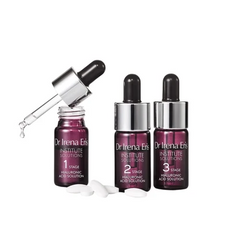Skincare for Youthful Skin: Is Your Collagen Production Enough?
Oh, collagen - the intriguing component that puts other anti-ageing property into a halt. It promises younger skin, lesser lines, and a brighter face that makes people think you're ten years younger. But what exactly is this mysterious component, and how can having enough of it benefit the overall health of the skin?
Read on to learn more about why this essential component matters to skincare, and the best ways to ensure that your skin soaks the benefits of having enough collagen.

What Is Collagen and Why It Matters
Collagen is a protein abundantly found in the hair, bones, and the skin. This component is the one tasked to hold up the skin’s structure. Like the skin’s scaffoldings, they provide volume to keep the skin from sagging, and from getting lines early. Plump, healthy skin? There’s collagen to thank for that.
Before we hit our 20s, the body naturally produces enough collagen for the skin.
But like all good things - collagen production deteriorates. Ageing, lifestyle, and environmental factors can lessen collagen production by 30%. As a result, the skin’s structure becomes weak, and skin begins to sag and lose its youthful plump.
This inevitable loss in collagen is the reason why using supplements, and applying topical skincare products that stimulate collagen production are a must.
Skin Check: Do You Need a Collagen Boost?
Taking cues from the physical signs of collagen deficiency can prompt you to give your skin collagen love, stat!
Sagging Skin
Loss of collagen = loss of skin structure. The absence of volume-giving cells can turn plump skin to saggy skin. The face can also look like it has lost its firmness and contour.
Appearance of Lines
Collagen is an essential part of the epidermis and dermis. As collagen decreases, the structure and elasticity of the epidermis and dermis also gets affected leaving the skin with a more unstable structure, lesser elasticity, and a higher chance of developing lines.
Dull Skin
The efficiency of the skin to reproduce healthy cells deteriorates as one ages. This decrease in collagen production affects the regeneration of healthy skin cells that bring a youthful, fresh, glowing touch to the face.
Skincare Routines for Better Collagen Production
What goes inside the body - food, drinks, supplements - play a big role in increasing the collagen production of the skin. Sleeping enough, and making lifestyle changes also delay collagen deficiency.
The things we do to care for the skin on a topical level can also help in maintaining the skin’s collagen levels. Consider adding these ingredients to your regular skincare routine.
Use Topical Vitamin C
The powerful vitamin C is known to stabilize procollagen messenger RNA that helps maintain and regulate the amount of collagen produced on the skin. The anti-ageing properties of Vitamin C also protects the skin from cell degeneration caused by UV rays.
We Recommend
Pack in Peptides
The topical application of peptides sends a message to skin cells to build elastin and collagen, which causes the skin to look and feel younger.
Add Retinol to Your Routine
Retinol aids in keeping the health and integrity of the skin. Applying retinol reduces water loss, prevents collagen loss, and reduces cell degradation.
Exfoliate with Peels
Collagen is a primary component released to fix wounds on the skin’s surface. The act of exfoliating introduces mild trauma to the skin to signal the production of elastin and collagen. Creating little pricks on the skin’s surface also stimulates the fibroblasts which signals the skin to double up in collagen production.
Wear Sunscreen
Sun damage is a big culprit in collagen and elastin loss. But the sun won’t always win - especially when you incorporate SPF in your morning routine.
When it comes to preventing premature skin ageing, it pays to nurture the component that keeps the skin’s youthful looks - collagen. Make your anti-ageing routine more effective and extensive - check out our tips for skincare in your 30s here.
Need some help putting together the best skincare routine for your skin type? Try our skin quiz!
Products Mentioned:










